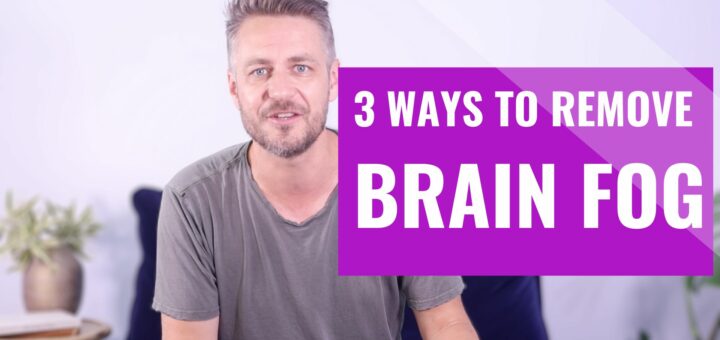3-Step Brain Fog Solution
My Simple 3-Step Brain Fog Solution
My new book The Alkaline Life is coming soon.
Pre-order your copy here
Links:
Recipes:
- High-Magnesium Smoothie Bowl
- Alkaline Breakfast Granola
- Alkaline Breakfast Bars
- Go-To Green Breakfast (also high mag)
Supplements:
Transcript for the 3-Step Brain Fog Solution
Hey – Ross Bridgeford here nutrition coach and author of the best selling Alkaline Reset Cleanse and forthcoming book The Alkaline Life, and today I want to share with you 3 simple, easy steps that can really reduce or remove the brain fog. These are super-low-hanging-fruit, and low hanging fruit is my favourite! Always the best place to start!
If you’re new here, please do remember to hit that subscribe button so you always get my new lessons when they are released, and you never miss a thing…and…..Let’s get into it…
Step One: Reduce or Remove GLUTEN from your life…
Gluten, along with sugar is perhaps THE most acid-forming, pro-inflammatory food. In an ideal world, it wouldn’t be in our diet at all…but it has snuck in, in dozens of ways, and caused a huge number of chronic health issues. In my opinion, the increase of gluten in our diet in the last 100 years is one of the main reasons why we have seen an increase in incidence of cognitive disease such as Alzheimer’s and Parkinson’s.
Why? Because gluten is terrible for the brain. Let me explain… When exposed to pepsin (a stomach enzyme) and hydrochloric acid (stomach acid produced to digest wheat), gluten is degraded to a mix of polypeptides.
These polypeptides are able to cross the blood-brain barrier, that separates the bloodstream from the brain.
This barrier is there for a reason. The brain is highly sensitive to the wide variety of substances that gain entry to the blood, some of which can provoke undesirable effects should they cross into your amygdala, hippocampus, cerebral cortex or other brain structure.
Once having gained entry into the brain, wheat polypeptides bind to the brains morphene receptor, the very same receptor that opiate drugs bind to.
These polypeptides have been labelled ‘exorphins’ – short for exogenous morphene like compounds and this is what creates the mini-high followed by the mood and energy slump right after.
Repeated exposure to these exomorphins (the dominant of which has been named gluteomorphin) leads to serious imbalance in the brain and has been proven to lead to a far higher likelihood of depression and schizophrenia.And it is at the root cause of brain fog, low mental energy, unclear thinking, and fatigue.
Research, including a study from the University of Sheffield, has observed cognitive deficits, worsened mental health, and white matter changes based on brain images in patients. When individuals with celiac disease or just gluten sensitivity adhere to a strict gluten-free diet, they no longer experience brain fog, suggesting a direct link between gluten ingestion and neurocognitive symptoms.
The study concluded that the individuals “had cognitive deficit, worsened mental health and white matter changes based on analysis of brain images.” When they were consuming gluten.
How to get it out? As with everything I teach to my Alkaline Life Club members, and in the Alkaline Life Book – it’s about the 20/80 – the 20% of actions that will bring you 80% of the result. So which meal are you regularly eating that are contributing 80% of the gluten in your diet? Start there. And instead of throwing everything out and starting again – what can you swap the gluten for?
Is it pasta? Simply use a good quality GF pasta, that is simple, without lots of ingredients. Is it bread – what can you swap for here? Could you use GF wraps.
Is it cereal? GF cereals are SO easy to find, or oats, quinoa, chia, buckwheat. I’ll include a delicious recipe from The Alkaline Life Book below.
You don’t have to be PERFECT, just aim to reduce, and you’ll be great.
STEP TWO: Add OMEGA 3…and include OMEGA 3 PHOSPHOLIPIDS specifically
Brain tissue is abundant in omega-3 fatty acids, where DHA makes up about 30% of the brain’s lipid content. The crucial role of omega-3 fatty acids for neurocognitive health spans from prenatal development through the entire course of life. But the vast majority of us are seriously depleted. A standard western diet doesn’t contain anywhere near enough omega 3 (if any), and even when TRYING to consume enough through diet alone it can be hard to reach the 3g of omega 3 we need each day.
Remember – omega 3 is known as an ‘essential’ nutrient, meaning our body cannot manufacture it, it needs us to consume it.
This is such an easy low hanging fruit win – I absolutely recommend you supplement with omega 3 every day, at that minimum level of 3g, and see everything you get through your diet as a bonus.
Studies suggest almost 70% of adults and 95% of children in the United States do not consume enough omega-3s to meet nutritional needs based on the US Dietary Guidelines.
If you have been experiencing any level of brain fog, anxiety, stress, depressive thought, mood impacts or anything else cognitive, I HIGHLY recommend you get your omega 3 intake up IMMEDIATELY.
For a supplement, I recommend consuming both regular omega 3 in the triglyceride form in other words EPA and DHA, and in the phospholipid form. Typically these will be two separate supplements. Any regular omega 3 product will contain EPA and DHA in varying concentrations. You will need to buy a specific phospholipid product to get the phospholipids.
Why phospholipids?
Phospholipid omega-3s have a higher bioavailability and potency for the brain due to their ability to cross the blood-brain barrier and participate in brain biochemical reactions. Unlike EPA and DHA, PL-bound omega-3 fatty acids can integrate into brain tissues and cell membranes, influence membrane fluidity, and affect signaling pathways and receptor function within the brain.
In the diet, you’ll find the biggest concentrations of phospholipids in roe, such as salmon roe. Other EPA and DHA omega 3 can be found in fish, nuts, seeds and so on.
From a supplement regime perspecitve, I recommend mixing it up like this:
- Day 1: 2g EPA/DHA, 1g phospholipid
- Day 2: 1g EPA/DHA, 2g phospholipid
- Day 3: 3g EPA/DHA
- Day 4: 3g phospholipid
And so on. So while you are buying two products instead of one, they will last longer and your overall cost will remain the same – as each day you’re consuming just the 3g recommended overall.
For vegan sources, in plants, the dominant omega 3 is ALA, which is converted by the body into EPA and DHA. It is a fair bit less efficient, however, there are vegan EPA/DHA blends available, that are made from algae and genetically engineered Camelina sativa (an oilseed plant from the Brassica family).
STEP THREE: Add MORE Magnesium, Specifically Magnesium l-Threonate
It is estimated that up to 80% of Americans are chronically deficient in magnesium. Magnesium is crucial for SO MUCH in the body, and again, it’s a simple step – find a good quality magnesium supplement to add to your lifestyle.
With brain fog, magnesium helps in lots of different ways;
- It plays a critical role in the synthesis and release of neurotransmitters, which are involved in mood, memory, and cognitive function.
- It has anti-inflammatory properties that can help reduce neuroinflammation in the brain, which can contribute to cognitive impairment and brain fog.
- It can relax blood vessels and improve blood flow to the brain, increasing the delivery of oxygen and nutrients to brain cells and supporting optimal brain function.
Studies have shown that magnesium helps improve learning and memory in Alzheimer’s disease and plays an important role in the health and longevity of brain cells.
Similar to omega 3, I recommend TWO types of magnesium, and again, use them together as a dose, rather than having the full dose of BOTH each day, to keep the cost the same, but the benefit with a wider reach.
So the ‘regular’ mag I recommend is magnesium glycerinate, and specifically for the brain I recommend Magnesium L-Threonate. THreonate is noted for its ability to effectively cross the blood-brain barrier, similar to phospholipids. This is due to its high solubility, which allows it to penetrate the brain where it can have a direct effect on cognitive functions. It has been shown to improve learning abilities, working memory, and short- and long-term memory in both young and old individuals.
It’s also amazing for improving sleep quality and quantity, so there is an extra bonus there for you too.
BELOW THIS VIDEO I have posted a few high-mag recipes for you too, along with all of my supplement recommendations.
And there you have it – THREE simple steps to get rid of brain fog. All three are things you can do TODAY, and together they will have a HUGE impact on your mental energy, clarity, mood, and more. When I work with my members in the Alkaline Life Club on this, they see results really quickly from making these three changes, it can be quite profound…
I cant WAIT to hear your results.
See you on the next video, and don’t forget to SUBSCRIBE for more videos like this!






Hi Ross,
I am trying to begin small and build up to 3 gr. The Omega 3 Phospholipids have 2 soft gels at a total of 850 mg. The Omega 3 Nordic Naturals have a total of 690 mg with 2 soft gels. I also know that 1000mg=1 GR. So, I have a total of 1450 mg or almost 1.5 GR. How do I take this using the daily program of which you spoke? Right now, I am taking 2 soft gels/day.
With the Neuro-Mag L-Threonate 3 gels =144 mg. The Magnesium Glycinate is 2 tablets for 200 mg. Right now, I am taking 1 of each/day. I am unsettled about the dosage.
I think the problem is in the translation of mg. to GR. Perhaps I could understand it better if you were to talk in terms of mg or tablets. (soft gels/ capsules) Would you identify the number of tablets per day for each item?
Thanks,
Yvonne
Ross,
I notice there are 2 Omega 3 supplements, one by Omega Via and the other by Nordic Naturals. Would I really need both of these with the Omega 3 Phospholipids? Could I take one or the other with the Omega 3 Phospholipids? I will be taking both Magnesium supplements.
Thanks,
Yvonne
Hi – take one regular omega 3 and mix this up with the phospholipds. Was just giving a choice 🙂
Ross,
What are your thoughts on Lions Mane and/or Ginkgo Biloba for brain health?
Thanks,
Yvonne
OK short term, but dont take continuously. Cycle on and off.
Hi Ross,
I am finally ready to order the supplements to decrease brain fog that you recommended. However, If I had to cut back and get only one of the Omega 3’s, would you recommend the one by Omega Via or by Nordic Naturals? I am not sure why I need both of them. I’m clear on needing the phospholipids, as well as all of the others.
Thanks,
Yvonne Cooper
Dad has stage 4 esophageal cancer, is doing chemo and its shrinking and he’s finally eating more again. I’m pushing your diet and supplements but given we need to put weight on him, I was hoping you had a suggestion since the shakes and greens seen to run right through him.
ALSO
What are your thoughts on some of the “Burpless” fish oils in regards to your brain fog supplements?
https://www.amazon.com/OmegaVia-Ultra-Concentrated-Omega-3-Enteric-Certified/dp/B00CJKJK1E/ref=sr_1_5?crid=NRDPGJSQA8E&keywords=omega+triglyceride+burpless&qid=1701886452&rdc=1&sprefix=omega+triglyceride+burpless%2Caps%2C186&sr=8-5
Food for Thought! Very well explained. You mentioned a video below. Sorry, I couldn’t locate it.